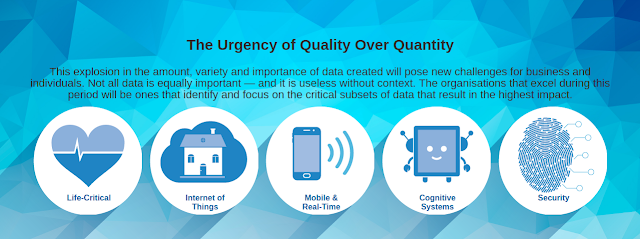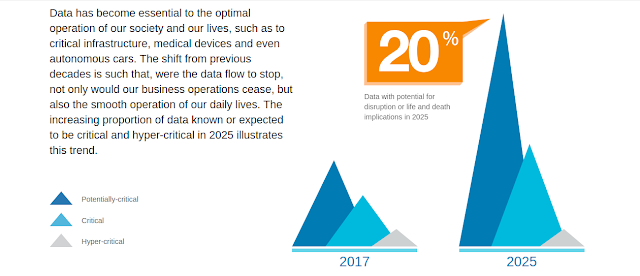 |
| FYI: Data units |
Internet has become one of the basic needs of every human being. The accessibility of internet has spiked in the recent past. We have several cloud platforms that help us store our data. On this context, Seagate has sponsored the project called Data Age 2025 that estimates amount of data that will be created in the near future. This research has revealed that we will have a data of 163 zettabytes (ZB) by 2025, which was just 16 zettabyte in 2016! (1ZB = 10^12 GB) This is ten times greater than the entire data we produced in 2016.
Here are some glimpses and analyses about the project.
Why data is growing so fast?
Starting from smartphones, till the servers, we have unlimited ways to generate data - data recorded on CC cameras, images and videos we capture on our mobile, data we generate from our PC, data created by embedded devices, clone data etc. In the initial stages of Digital Revolution, data was generated merely from PCs. But today, even a toy is capable of generating data and save it over the available cloud platforms.
 |
| Sources of data acquisition |
"Embedded devices" are the most emerging and key playing devices in our daily life. When viewd as discrete data, the embedded devices refer to a minute part of data generation. But when put on a whole, the Data Age 2025 reports that the data from embedded devices will be 20% by 2025. The automotive industry is growing at a remarkable pace. Once the concept of smart cars becomes a pure reality, the data acquisition increases further more and with the intervention of IoT, the demand of that data becomes unavoidable.
Maintaining the benefits of the Data Age:
Acquiring data in these ways is only targeted to improve the user experience in accessing refined data. For example, Data Age 2025 describes how the services like NetFlix and Facebook are gathering user data to provide intended and user-specific ads. NetFlix collects the data to provide better recommendations based on the previous queries and views. The same way, Facebook collects the information about the pages you access when using it. This helps Facebook to target the audience for ads through the statistics collected.
 |
| Data creation and storage statistics |
Here are the key notes and highlight of the Data Age 2025 report:
- On an average, today, one individual is holding an embedded device. This number is going to be more than four in the next ten years. Hence, data generation from an individual is going to be quadrupled in next ten years.
- In the coming eight years, the number of times a user accesses the connected device will reach to 4,800 times a day!
- By 2025, 75% of the world's population will be connected to the internet irrespective of their geographical location. (I wonder if 75% of the population gets some feed everyday!)
- By 2025, the data generated will compromise of 25% real-time data, out of which 95% will be from the device with IoT.
- We are always exploitable when connected to the internet and by 2025, 95% of the devices need new security mechanisms to provide data security.
- Most alarming detail: The global datasphere* will consist of 20% of data, without which the continuity of our lives is not achieved! (Not sure if we are becoming "smart" or getting more attentive by being vulnerable!)
 |
| Data critiality in 2017 and 2025 |
Appeal to the organization to "organize" and cope data growth by Seagate:
Seagate is urging the CEOs of the major organizations to have a strategy to maintain the rigurous data acquisition growth. If not managed, there will be adverse effects to be faced; not just financial effect but also crisis related to data may turn up! Seagate quotes the data acquired to help the user experience better, as "data wealth".
 |
| Data security criticality |
As Seagate CEO Steve Luczo noted today, “While we can see from this new research that the era of Big Data is upon us, the value of data is really not in the ‘known,’ but in the ‘unknown’ where we are vastly underestimating the potentials today. What is really exciting are the analytics, the new businesses, the new thinking and new ecosystems from industries like robotics and machine-to-machine learning, and their profound social and economic impact on our society.”
*Global datasphere is the term to represent data collectively, acquired all over the globe.










